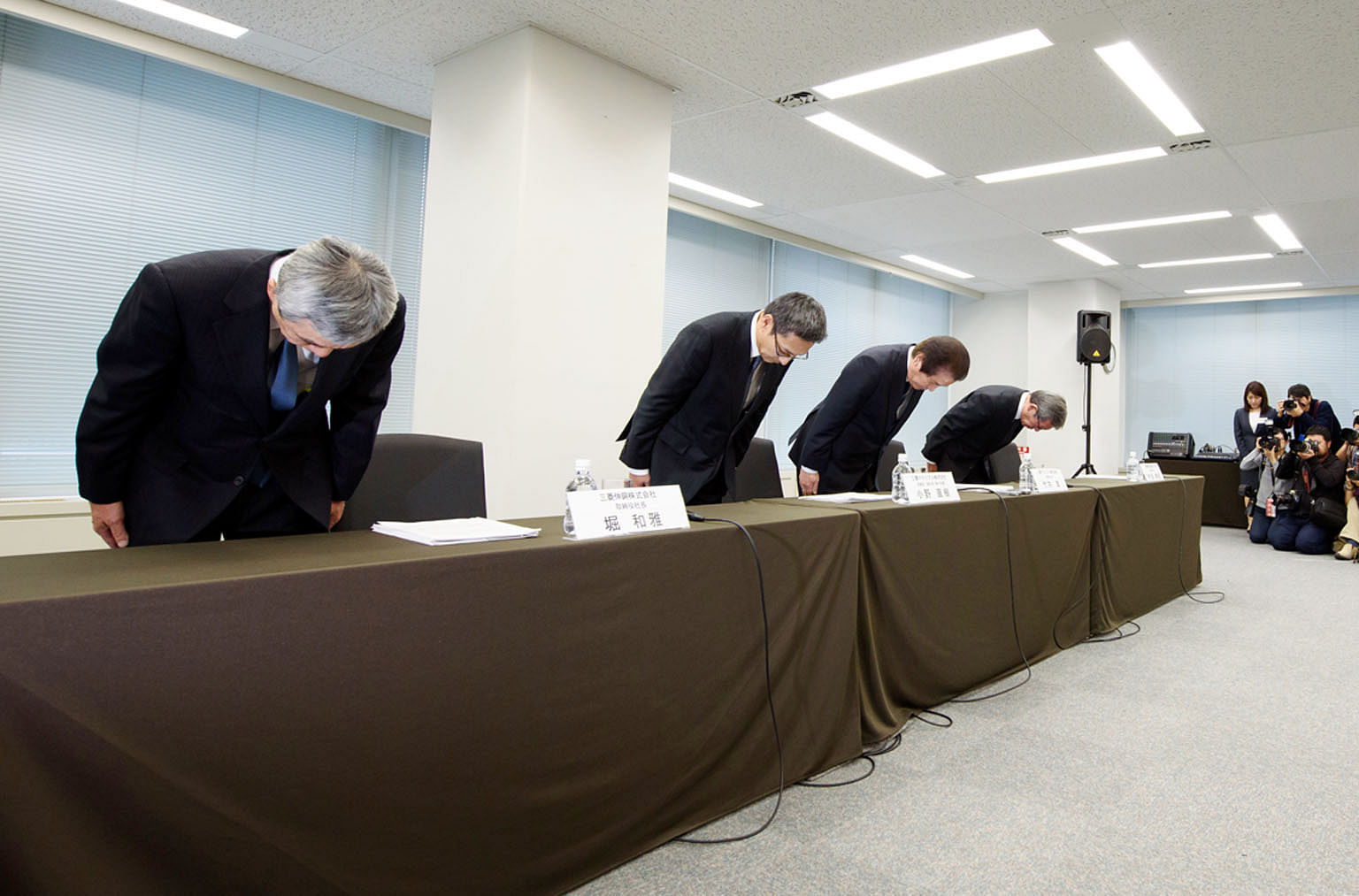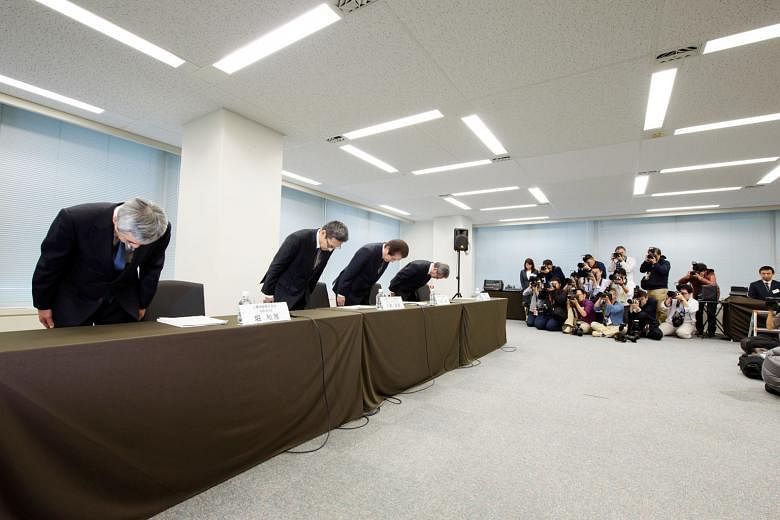In feudal Japan there was harakiri, or ritual suicide, whenever a grave wrongdoing was uncovered.
The bloodless, modern day form of repentance, the saikeirei - the deep, long, profoundly contrite bow - has of late been taking place frequently in front of flashing cameras.
Like a series of falling dominoes, the top brass of Japanese conglomerates have been saying sorry for issues that, on paper, sound characteristically un-Japanese.
Or perhaps not. A country that has long got bad press for its oppressive overtime leading to karoshi (death by overwork) is now in the news for systemic detakaizan (data tampering).
While Japan prides itself on its precision and quality - amid stiffening competition for contracts from the region - it has been battered by revelations that so many of its companies have failed to live up to the promised gold standards.
Since Oct 8, when the besieged Kobe Steel confessed to systemic data fraud that has lasted for almost a decade, there have been revelations from car-makers Nissan and Subaru, as well as manufacturers Mitsubishi Materials last Friday and Toray Industries on Tuesday.
And this is not to mention other debacles of years past: Tepco's lax regulatory practices that led to the crippling nuclear meltdown of 2011, Takata's deadly airbags, Mitsubishi Motors' falsification of fuel efficiency tests, Toshiba's wretched accounting issues, and fraud at medical equipment maker Olympus, to name a few.

Mr Nicholas Benes, head of The Board Director Training Institute of Japan, says the recent spate of revelations has shades of the hospitality scandal in 2013, when the admission by the luxury Hanshin Hankyu hotel that it had used sub-par ingredients led to at least 15 high-end restaurants confessing within weeks that they, too, had duped diners, among them Michelin guide inspectors.
"They all seemed to figure that it was a great time to come clean, in the melee when Hanshin had already taken the heat and there was safety in numbers," he says. "The point is that senior executives must have known about the falsifications in advance, because it is not possible to investigate everything anew within two or three weeks."
What is especially unnerving about the likes of Kobe Steel, Mitsubishi Materials and Toray Industries is that they are typically invisible business-to-business entities whose technology is in aircraft, cars and bullet trains - and in the case of Toray, Uniqlo's popular heat-tech range of clothing.
And there may be more companies lurking in the shadows, as implied in Toray president Akihiro Nikkaku's candour when he admitted that the company had not intended to go public with its issues, which occurred from 2008 to 2016.
But what changed his mind were the other firms that came forward, as well as the anonymous Internet chatter that Toray, too, was guilty. "There were no legal violations or safety problems; this was between us and our customers, and so there was no need to disclose it."
TECH ARROGANCE
Japan's technological superiority is a double-edged sword, industry observers tell The Straits Times, and could be a key factor behind the recent flurry of incidents.
There is one theory that the bar is set so onerously high that it has created a belief that cutting corners by a little would not lead to massive product defects. In fact, the likes of Kobe Steel, Mitsubishi Materials and Toray all came clean with the caveat that while figures have been doctored, they were marginally below the quality standards - which means the parts would pose no safety or functional defects.
Mr Benes, who was an adviser to the drafting of Japan's first corporate governance code, tells The Straits Times: "In some cases engineers know that certain aspects of the Japanese Industrial Standards for quality do not actually affect the 'real-world' quality much at all." He adds: "And amid quota pressures from above, it becomes easier to rationalise cutting a few corners as 'obeying unspoken orders'."
Top corporate governance lawyer Shin Ujishima, meanwhile, adds that many Japanese conglomerates could have got away with their longstanding malpractices because of the excellent relationships they forged with their clients, who in turn do not verify the delivered products due to mutual trust. "But those happy days are gone."
ERODING WORKPLACE LOYALTY
Over the years, Japanese firms have carved a reputation for monotsukuri, which broadly refers to the careful craftsmanship of products, says Dr Parissa Haghirian, an expert in international management at Tokyo's Sophia University.
"These traditional Japanese companies hired employees right after graduation. Even if they were no engineers or business school graduates, this did not matter because they were supposed to stay for 30 years or more and learn the processes over the years," she adds.
But this image of a "loyal" Japanese worker has been chipped away by the national push for higher profits - thus squeezing wages and presenting a notable shift towards an "irregular" contract workforce.
Mr Ujishima, who is also president of the Japan Corporate Governance Network, notes that in the early 2000s, there were 15 irregular workers in every 100 employees. This figure is now about 40.
What this means, he says, is that despite Japan's rosy jobs figures with unemployment at decade lows, many are stuck in poorly paid, dead-end jobs with little prospect for career advancement. And with that goes the ideals of commitment and the push to do one's best.
Mr Benes adds that the distance between engineers at the plant - who are expected to meet premium quality standards - and executives in the office with unrealistic profit targets has led to top-down pressure for results, achieved by the easy way out of cutting corners.
Senior research fellow Martin Schulz of the think-tank Fujitsu Research Institute says: "Companies, in an environment of social ageing and slow growth, have put a very strong focus on cost-cutting and continuously working harder. Cost-cutting, however, adds little new value and reaches its limits when colliding with quality control.
"The increasing focus on profitability mixes badly with a culture of group orientation, seniority progress and face-saving."
Japan's woes are exacerbated by global competition in an age of disruption, says economist Koji Morioka of Kansai University, adding that the race for contracts is forcing Japanese firms to do more with less.
He says the series of incidents has hurt the credibility of Japanese firms. On Tuesday, Chief Cabinet Secretary Yoshihide Suga urged businesses not to "betray the high trust placed in Japanese products" around the world.
Japan's quality has long been one of the country's soft power assets, University of Tokyo professor Heng Yee Kuang, who studies diplomacy issues, noted.
SO, WHAT NEXT?
The succession of incidents may lead to an awakening in Japan that will prompt more companies to shape up and speak out - as has been the gradual movement to address excessive overtime issues.
While culturally, there has been a tendency to not disclose embarrassing incidents, Mr Benes says: "Japan now has many 'quiet, anonymous whistle-blowers' who want to do the right thing, but go direct to the authorities or third parties when they see malfeasance rather than suffer the risk of retribution if they tell executives within the company.
"The spate of recent incidents is scaring many companies to be on their guard, and consider preventive measures."
One such measure that needs to be undertaken, Mr Ushijima says, is to strengthen risk management systems, including giving the board of directors a bigger say during times of crises for a fresher perspective.
Dr Schulz adds that companies will also be forced to confront their chronic productivity issues in a concerted push towards workplace reforms.
"Since (the misconduct) is now in plain sight and cannot be ignored anymore, they have to focus on increasing productivity and compliance by working 'smarter' instead of just harder, which should also improve governance results."


